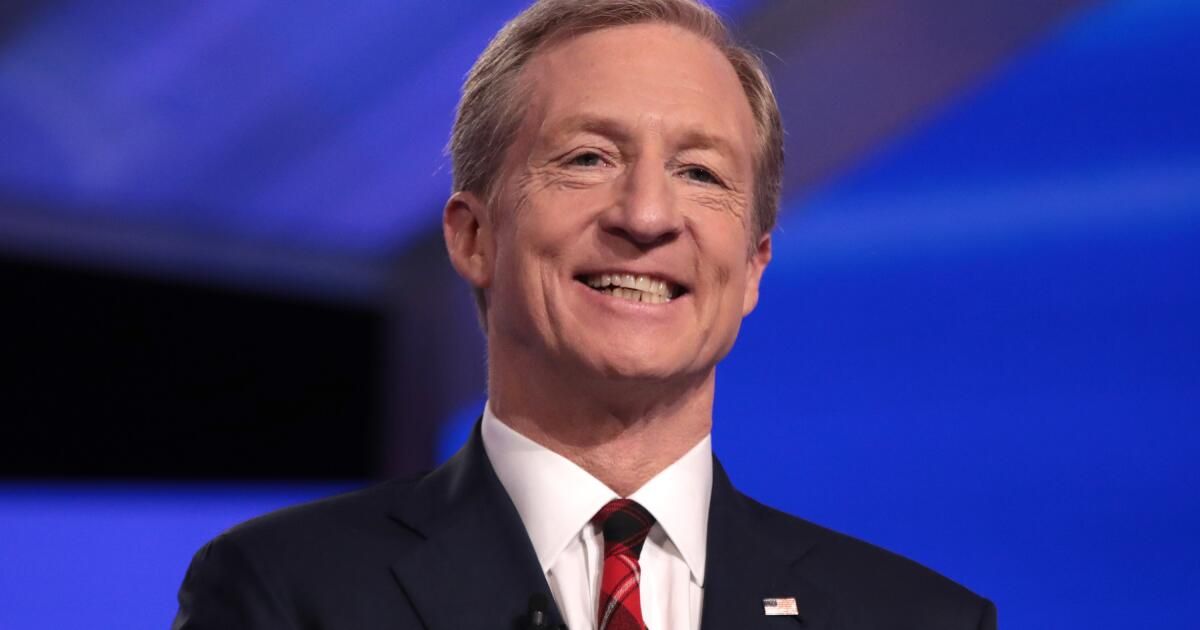Billionaire hedge fund founder Tom Steyer announced Wednesday that he is running for governor of California, arguing that he is not beholden to special interests and can take on corporations that are making life unaffordable in the state.
“The richest people in America think they earned it all themselves. Bulls…, man. That's so ridiculous,” Steyer said in an online video announcing his campaign. “We have a broken government. It's been bought by corporations and my question is: Who do you think is going to change that? The politicians in Sacramento are afraid to change this system. I'm not. They're going to hate this. Go ahead.”
Protesters hold banners and banners during a demonstration against Whitehaven Coal in Sydney in 2014. Dozens of protesters and activists gathered downtown to protest against the controversial massive Maules Creek coal mine project in northern New South Wales.
(Saeed Khan / AFP/Getty Images)
Steyer, 68, founded Farallon Capital Management, one of the country's largest hedge funds, and left in 2012 after 26 years. Since his departure, he has become a global environmental activist and a major donor to Democratic candidates and causes.
But the hedge firm's investments — notably a giant coal mine in Australia that cleared 3,700 acres of koala habitat and a company that runs immigration detention centers on the U.S.-Mexico border for U.S. Immigration and Customs Enforcement — will make him susceptible to political attack from his gubernatorial rivals.
Steyer has expressed regret over his involvement in such projects, saying it was why he left Farallon and began focusing his energy on fighting climate change.

Democratic presidential candidate Tom Steyer addresses a crowd during a presidential primary night party in Columbia, South Carolina.
(Sean Rayford/Getty Images)
Steyer previously flirted with running for governor and the U.S. Senate, but decided against it and opted to run for president in 2020. He dropped out of the race after spending nearly $342 million on his campaign, which gained little traction before his race ended after the South Carolina primary.
Next year's gubernatorial race is in flux, after former Vice President Kamala Harris and Sen. Alex Padilla decided not to run and Proposition 50, the successful Democratic effort to redraw congressional districts, consumed all the political oxygen during an off-year election.
Most voters are undecided about who they would like to replace Gov. Gavin Newsom, who cannot run for re-election due to term limits, according to a poll released this month by the UC Berkeley Institute of Government Studies and co-sponsored by The Times. Steyer was supported by 1% of voters in the poll.
In recent years, Steyer has long been a benefactor of progressive causes and recently spent $12 million to support the redistricting ballot measure. But when he was the center of one of the ads, rumors surfaced that he was considering running for governor.
In previous California ballot initiatives, Steyer successfully supported efforts to close a corporate tax loophole and raise tobacco taxes, and fought oil industry-backed efforts to roll back environmental law.
His campaign platform is to build 1 million homes in four years, reduce energy costs by ending monopolies, make preschools and community colleges free, and ban corporate contributions to political action committees in California elections.
Steyer's brother Jim, leader of Common Sense Media, and the former Biden administration's U.S. surgeon general, Vivek Murthy, aim to put an initiative on next year's ballot to protect children from social media, specifically chatbots that have been accused of prompting young people to commit suicide. Newsom recently vetoed a bill aimed at addressing this AI issue.












